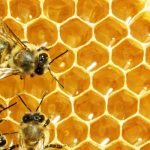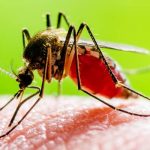
Mosquitoes in Illinois in the summer can seem inescapable. Sometimes, you just want to holler at them, “Can’t I catch a break?!” But yelling at mosquitoes won’t do anything to solve your problem – killing their larvae will. As the trusted leaders in mosquito control in Illinois, the experts at Terminix Anderson know a thing or two about finding and killing mosquito larvae, so we’re going to share some helpful tips.
First, the quick answer. If you’re looking for a thorough explanation, click here for our comprehensive guide to killing mosquito larvae.
If you want to kill mosquito larvae on your property, here’s what you need to do:
- Eliminate standing water on your property
- Treat the water to ensure larvae are killed
- If you can’t dump out or treat the water yourself, consider calling a professional
Mosquito larvae need water to develop. They cannot turn into mosquitoes without it.
Now that you know the basics, let’s dive deeper into the topic, highlighting some common areas that can easily turn into mosquito breeding grounds, and tips to ensure the larvae doesn’t survive.
Ready for a Pest Control Quote?
Click the button below to leave your information and we'll be in touch with a free quote!
Listen and Learn
Hit play to hear an audio version of the advice on this page.
Our Comprehensive Guide on How to Kill Mosquito Larvae Safely
By eliminating standing water, you’re using mosquitoes’ biology against them. Yes, it’s very easy. You’ll also be amazed at how effective it is.
Part 1: Eliminating Standing Water on Your Property
To keep mosquitoes from taking over your yard this summer, you need to be able to identify potential mosquito breeding sites on your property and proactively eliminate them.
Where Do Mosquitoes Lay Their Eggs?
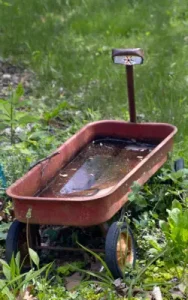
Toys that are left out in the rain can fill with water and become mosquito breeding sites.
Mosquitoes have to find a source of stagnant water to lay their eggs. This water source can be anything from big ponds and pools to tiny puddles and water build-up in gutters. So long as the water stays calm for a week to ten days, mosquito eggs can hatch and the larvae can thrive, growing into their adult stage.
Our mosquito specialists at Terminix Anderson frequently discover mosquito larvae and eggs in all of these places.
Let’s start with some of the most obvious spots to check:
- Containers: Buckets, watering cans, trash cans, and recycling bins can collect rainwater. Store them upside down or in a covered area.
- Flower Pots and Saucers: Excess water can accumulate in the saucers under potted plants. Empty them regularly.
- Bird Baths: Change the water at least once a week to prevent mosquito larvae from maturing.
- Pet Water Bowls: Refresh outdoor pet water bowls daily.
- Children’s Toys: Wading pools, toy trucks, and other toys left outdoors can collect water. Store them indoors or turn them over when not in use.
- Tires: Discarded tires are notorious for collecting stagnant water and creating ideal breeding conditions for mosquitoes. Drill drainage holes in tires used for playground equipment.
- Tarps and Covers: Tarps covering firewood, boats, grills, or swimming pools can develop pockets where water can collect. Ensure they are pulled taut to allow for proper drainage.
- Wheelbarrows: Store wheelbarrows upside down or on their side to prevent water from accumulating.
- Clogged Gutters and Downspouts: Leaves and debris can block gutters, causing water to pool. Regularly clean your gutters to ensure proper water flow.
- Leaky Faucets and Hoses: Dripping outdoor faucets and hoses can create puddles of water. Repair any leaks promptly.
- Rain Barrels: While great for water conservation, rain barrels should be securely covered with a fine mesh screen to prevent mosquitoes from laying eggs in the collected water.
- Tree Holes and Stumps: Hollows in trees and stumps can fill with rainwater. Fill these cavities with sand or a hardening foam.
- Low-Lying Areas in the Yard: Depressions in your lawn can collect water after rainfall. Level these areas with soil or improve drainage.
Don’t forget to check easily overlooked spots like these:
- Grill Covers: The folds and wrinkles in grill covers can trap small amounts of water.
- Under Decks and Porches: Areas under decks and porches can be damp and may have items that collect water.
- Hollow Fence Posts: Uncapped fence posts can fill with rainwater.
- Yard Debris: Piles of leaves, grass clippings, and other yard waste can hold moisture and create breeding grounds.
- Footprints: Even deep footprints in muddy areas can hold enough water for mosquitoes to breed.
What If You Can’t Find Where Mosquitoes Are Laying Their Eggs?
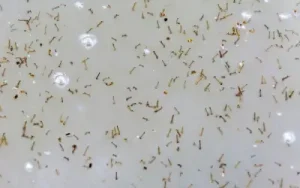 If you can’t find mosquito breeding spots in your yard, don’t worry – this is a common problem. Mosquito larvae only need a tiny amount of water to develop. People are often surprised by how little it takes.
If you can’t find mosquito breeding spots in your yard, don’t worry – this is a common problem. Mosquito larvae only need a tiny amount of water to develop. People are often surprised by how little it takes.
If you can’t find the mosquito breeding sites on your property, our professional mosquito control technicians will. We offer free mosquito control inspections, so call us to schedule yours.
What Are the Signs That Mosquitoes Are Breeding in Your Backyard?
1. There are lots of mosquitoes flying around.
If this is happening to you, we recommend these tips to prevent mosquito bites.
2. You have standing water on your property.
If you have lots of water on your property, it’s safe to say they’re breeding there or somewhere close by. Mosquitoes don’t travel very far in their lifetimes. They’re relatively poor fliers, and most spend their lives near their birthplace. So by eliminating standing water, you can eliminate mosquito breeding sites.
- With small puddles and collected water in birdbaths or children’s toys, you can dump the water out, and that will make a huge difference.
- If you have a pool or pond on your property, you may not want to drain all of the water, but you may be able to safely treat it to kill off mosquitoes.
- If your property backs up to a creek or large body of water, you can’t treat the water, but there are still solutions – like professional mosquito treatment. A professional mosquito control company offers advanced solutions like barrier treatments and mosquito repellent systems.
Part 2: Safely Treat the Standing Water to Ensure Mosquito Larvae Are Killed
If you find wriggling mosquito larvae or a raft of eggs on your property, make sure they can’t turn into adult mosquitoes. If you pour them out onto a hot, dry surface like sun-baked concrete, this is typically enough. However, if you’re going to pour them out onto your grass, you should make sure the larvae are killed first.
How to Kill Mosquito Larvae in Standing Water
There are a few common household products you can add to standing water to kill mosquito larvae before you dump it out. Here’s what we recommend:
- Soap: Pouring a bit of dish soap or shampoo into an inhabited water source will kill any larvae after a day.
- Apple cider vinegar: This works best on larvae living in very small water sources—add enough apple cider vinegar so that it makes up about 15% of the total liquid. It should get rid of them in about 18 hours.
- Cooking oil: Olive oil and vegetable oil will get rid of mosquito eggs and larvae quickly. Do not put any oils in a birdbath used by birds or wildlife, or a pond where fish live.
What Do Mosquito Larvae Look Like?
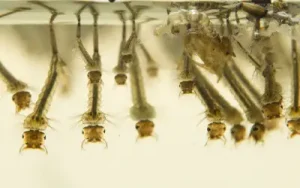
Close-up of some wrigglers floating on top of a pool.
Mosquito larvae, known as “wrigglers,” look like tiny, hairy worms swimming in water.
You can spot them by these key features:
- Appearance: They are about a quarter-inch long with a distinct head and a soft, segmented body.
- Color: Varies from translucent white to shades of gray, brown, or nearly black to camouflage in the water.
- Behavior: They typically hang upside down from the surface of still water, breathing through a small tube (a siphon) at their tail end.
- Movement: They move with a characteristic wiggling or jerking motion as they dive deeper.
Ready for a Pest Control Quote?
Click the button below to leave your information and we'll be in touch with a free quote!
Part 3: If You Can’t Eliminate the Larvae Yourself, Consider Calling a Mosquito Control Professional
If you can’t eliminate standing water that’s contributing to a mosquito problem, or treating the water is impossible, it’s going to be difficult to control the mosquito population on your property.
When Do You Need Professional Mosquito Control?
When you’re unable to eliminate mosquito larvae yourself, a professional mosquito exterminator might be able to – or they can use advanced mosquito control technology to protect your property.
At Terminix Anderson, we have extensive experience using cutting-edge treatments that can keep mosquitoes away from you, even when there are tons of them in the area. Some of our recommended treatments include:
- Barrier treatments: Create a protective barrier around your property, typically applied to foliage and other surfaces where mosquitoes rest. This treatment kills mosquitoes on contact and can be effective for several weeks.
- Mosquito repellent systems: These systems often involve automated diffusers that release a repellent mist into the air, creating a mosquito-free zone. They are designed to deter mosquitoes from entering or lingering in a treated area.
Call Us for Mosquito Larvae Control in Illinois
Sometimes mosquitoes lay their eggs in hidden water sources that are hard to find. If you’re currently dealing with a mosquito infestation in your yard, talk to your local pest control experts.
At Terminix Anderson, we have set up barrier treatments for all sorts of homes across Illinois & Indiana and are well aware of the habits and hiding places of mosquitoes in our region. If you want to learn more about our services or need a free quote on mosquito control, contact us today!



